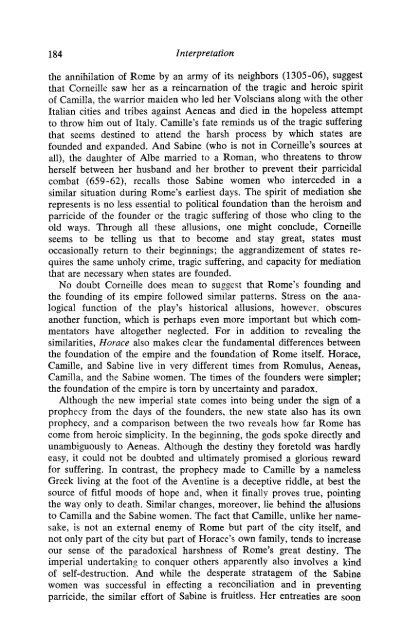Interpretation: A Journal of Political Philosophy
Interpretation: A Journal of Political Philosophy
Interpretation: A Journal of Political Philosophy
Create successful ePaper yourself
Turn your PDF publications into a flip-book with our unique Google optimized e-Paper software.
184<br />
<strong>Interpretation</strong><br />
the annihilation <strong>of</strong> Rome by an army <strong>of</strong> its neighbors (1305-06), suggest<br />
that Corneille saw her as a reincarnation <strong>of</strong> the tragic and heroic spirit<br />
<strong>of</strong> Camilla, the warrior maiden who led her Volscians along with the other<br />
Italian cities and tribes against Aeneas and died in the hopeless attempt<br />
to throw him out <strong>of</strong> Italy. Camille's fate reminds us <strong>of</strong> the tragic suffering<br />
that seems destined to attend the harsh process by which states are<br />
founded and expanded. And Sabine (who is not in Corneille's sources at<br />
all), the daughter <strong>of</strong> Albe married to a Roman, who threatens to throw<br />
herself between her husband and her brother to prevent their parricidal<br />
combat (659-62), recalls those Sabine women who interceded in a<br />
similar situation during<br />
Rome's earliest days. The spirit <strong>of</strong> mediation she<br />
represents is no less essential to political foundation than the heroism and<br />
parricide <strong>of</strong> the founder or the tragic suffering <strong>of</strong> those who cling to the<br />
old ways. Through aU these allusions, one might conclude, CorneiUe<br />
seems to be telling us that to become and stay great,<br />
states must<br />
occasionally return to their beginnings; the aggrandizement <strong>of</strong> states re<br />
quires the same unholy crime, tragic suffering, and capacity for mediation<br />
that are necessary when states are founded.<br />
No doubt Corneille does mean to suggest that Rome's founding and<br />
the founding <strong>of</strong> its empire followed similar patterns. Stress on the ana<br />
logical function <strong>of</strong> the play's historical allusions, however, obscures<br />
another function, which is perhaps even more important but which com<br />
mentators have altogether neglected. For in addition to revealing the<br />
similarities, Horace also makes clear the fundamental differences between<br />
the foundation <strong>of</strong> the empire and the foundation <strong>of</strong> Rome itself. Horace,<br />
Camille, and Sabine live in very different times from Romulus, Aeneas,<br />
Camilla, and the Sabine women. The times <strong>of</strong> the founders were simpler;<br />
the foundation <strong>of</strong> the empire is torn by uncertainty and paradox.<br />
Although the new imperial state comes into being under the sign <strong>of</strong> a<br />
prophecy from the days <strong>of</strong> the founders, the new state also has its own<br />
prophecy,<br />
and a comparison between the two reveals how far Rome has<br />
come from heroic simplicity. In the beginning, the gods spoke directly and<br />
unambiguously to Aeneas. Although the destiny they foretold was hardly<br />
easy, it could not be doubted and ultimately promised a glorious reward<br />
for suffering. In contrast, the prophecy made to Camille by a nameless<br />
Greek living at the foot <strong>of</strong> the Aventine is a deceptive riddle, at best the<br />
source <strong>of</strong> fitful moods <strong>of</strong> hope and, when it finally proves true, pointing<br />
the way only to death. Similar changes, moreover, lie behind the allusions<br />
to Camilla and the Sabine women. The fact that Camille, unlike her name<br />
sake, is not an external enemy <strong>of</strong> Rome but part <strong>of</strong> the city itself, and<br />
not only part <strong>of</strong> the city but part <strong>of</strong> Horace's own family, tends to increase<br />
our sense <strong>of</strong> the paradoxical harshness <strong>of</strong> Rome's great destiny. The<br />
imperial undertaking to conquer others apparently also involves a kind<br />
<strong>of</strong> self-destruction. And while the desperate stratagem <strong>of</strong> the Sabine<br />
women was successful in effecting a reconciliation and in preventing<br />
parricide, the similar effort <strong>of</strong> Sabine is fruitless. Her entreaties are soon

















